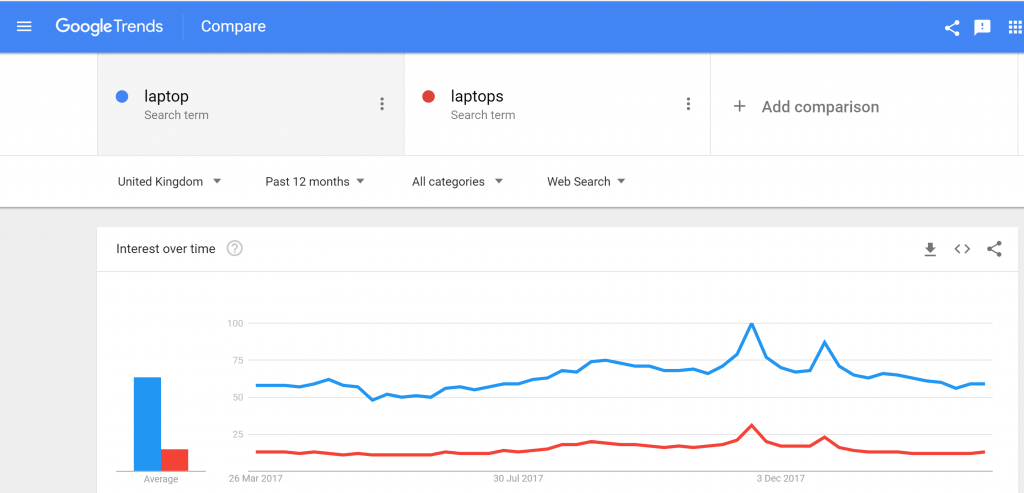Is it better to use the singular version of your keyword, or is it better to use the plural version? For example, will I get more traffic for the word “laptop” or “laptops?” And do you need an SEO strategy to target these variations of a keyword?
The answer of course, is it depends. There is never a one-size-fits-all answer to selecting your key phrases.
Google says “yes” to singular and plural keywords
First and foremost, Google guru Jon Mueller has confirmed that the search engine sometimes considers the singular and plural version of a keyword to be different, as reported in Search Engine Journal:

Keyword variations signal user intention
There are many examples of where there is a distinct difference in meaning between the singular and plural version of a word: for example, cosmetic and cosmetics, blind and blinds, or air and airs.
In terms of search engine optimisation, Google is looking for meaning and context in order to serve the best possible results.
And so variations in keywords can also signal meaning.
Hitwise produced a very interesting analysis comparing the top 10 key phrases containing the word “laptop”, excluding branded terms. They conclude that the use of the singular or plural versions might indicate different buying behaviours.
Phrases like “cheap” and “free” appear prominently on both versions, but Hitwise identified that for the top phrases:
- The singular version was more commonly used when looking for laptop accessories like batteries, bags and cases
- The plural version contained stronger buying signals, like “laptops UK” or “pink laptops”
- The singular version also contained plural qualifiers like “laptop computers”
When analysing which phrases then resulted in searchers going to a shopping website, Hitwise concluded the plural version generally drove more visitors to ecommerce or buying sites. You might, therefore, conclude that the plural version would be best for your search engine optimisation strategy.
Google Trends data
However, if we look at the Google Trends data comparing laptop vs laptops search volumes, we see that many, many more users in the UK are searching for variations of the singular, compared to the plural versions:

So what is going on? This is referring to long tail keyword searches, where users are searching for literally thousands of variations of your keywords, for example: “lightweight laptop” or “fingerprint recognition laptop.”
More importantly, there are strong buying signal type phrases like “best laptop.”
So what might we conclude from all this?
The main consideration for your keyword selection and research is to always keep your user at the centre of your thinking and planning. What is the intention of their search? What do they mean? And how is Google best trying to meet their needs?
The next step is to undertake research and let the numbers help you to guide your thinking:
- Compare the search volume of your specific phrases, for instance: “laptops uk” vs “laptop uk” and build your content and linking strategy accordingly
- Don’t overlook the broader keyphrases that encompass the high-quality detailed searches your prospects may be using
For more help with your SEO strategy, get in touch with our experts today.






